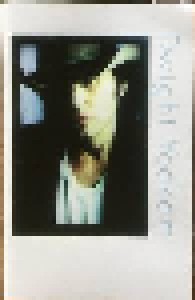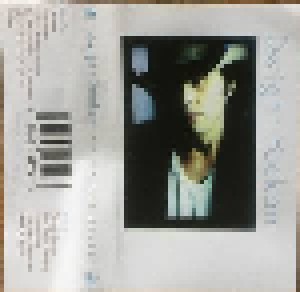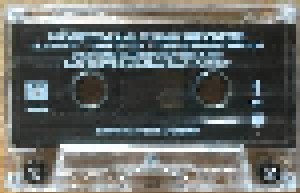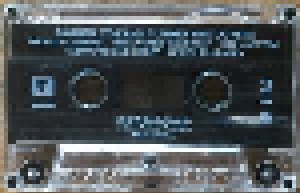Menu
Dwight Yoakam
Under The Covers
Tape, 1997
| Herstellungsland | USA |
|---|---|
| Veröffentlichungs-Jahr | 1997 |
| Zeit | 36:49 |
| EAN-Nr. | 093624669043 |
| Label/Labelcode | nicht vorhanden |
| Plattenfirma/Katalog-Nr. | Reprise Records / Warner / 9 46690-4 |
| Musikrichtung | Country |
| Sammlungen | Gesucht | Flohmarkt |
|---|---|---|
| 0 | 0 | 0 |
Tracklist
I = Instrumental
L = Live
B = Bonustrack
H = Hidden Track
C = Coversong
| Tape | |||
|---|---|---|---|
| Track | Titel | Zeit | Besonderheit |
| Gesamtzeit | 36:49 | ||
| A 1. | Claudette | 2:59 | C |
| A 2. | Train In Vain | 3:23 | C |
| A 3. | Tired Of Waiting For You | 3:00 | C |
| A 4. | Good Time Charlie's Got The Blues | 3:18 | C |
| A 5. | Baby Don't Go [With Sheryl Crow] | 4:01 | C |
| A 6. | Playboy | 2:23 | C |
| B 7. | Wichita Lineman | 2:55 | C |
| B 8. | Here Comes The Night | 3:20 | C |
| B 9. | The Last Time | 3:59 | C |
| B 10. | Things We Said Today | 3:51 | C |
| B 11. | North To Alaska | 3:40 | |
Infos
MC klar, Beschriftung silbergrau
Under the Covers is the seventh studio album, and the first covers album recorded by Dwight Yoakam. It peaked at No. 8 on Billboard's Top Country Albums chart, and No. 92 on the Billboard 200. (Wikipedia)
Track # 11: Gesamtlänge 9:14 --> tatsächliche Spielzeit 3:40, dann 0:02 Stille, dann Hidden Track (hier Track # 12) 5:32
"Claudette" (Roy Orbison) - first published by The Everly Brothers, 1957.
"Train in Vain" (Mick Jones, Joe Strummer) - a song by the British punk rock band The Clash. It was released as the third and final single from their third studio album, London Calling (1979).
"Tired of Waiting for You" (Ray Davies) - a hit 1965 rock song by the English band The Kinks. The song was released as a single on 15 January 1965 in the UK and on 17 February 1965 in the USA. It then appeared on their second studio album Kinda Kinks.
"Good Time Charlie's Got the Blues" (Danny O'Keefe) - first recorded by O'Keefe in 1967, but not released. It was recorded by The Bards and released in 1968 as the b-side to the song "Tunesmith" on Parrot Records. The Bards were a band from Moses Lake, Washington. The song was recorded by O'Keefe for his self-titled debut album in 1971.
"Baby Don't Go" (Sonny Bono) - recorded by Sonny & Cher. It was first released on Reprise Records in 1964 and was a minor regional hit.
"Playboy" (Robert Bateman, Brian Holland, Gladys Horton, William "Mickey" Stevenson) - Gladys Horton, lead vocalist of the Motown singing group The Marvelettes. They recorded the song and released it as a single on Motown's Tamla imprint in 1962.
"Wichita Lineman" (Jimmy Webb) - written in 1968, first recorded 1968 by American country music artist Glen Campbell with backing from members of The Wrecking Crew and widely covered by other artists.
"Here Comes the Night" (Bert Berns)- a 1964 song, written by Bert Berns. It became a hit for Northern Irish band Them, fronted by Van Morrison, in March 1965, charting at No. 2 in the UK and No. 24 in the US.
"The Last Time" (Mick Jagger, Keith Richards) - a song by The Rolling Stones and the band's first single written by Mick Jagger and Keith Richards. Recorded at RCA Studios in Hollywood, California in January 1965, "The Last Time" was the band's third UK single to reach number one on the UK Singles Chart, spending three weeks at the top in March and early April 1965.
"Things We Said Today" (John Lennon, Paul McCartney) - a song by The Beatles written by Paul McCartney and credited to Lennon–McCartney. It was composed for the film A Hard Day's Night but was eventually not included. It does appear on the soundtrack album. It was also released as the B-side of the single "A Hard Day's Night" in the UK.
"North to Alaska" (Mike Phillips) - a 1960 hit song recorded by Johnny Horton which featured in the movie of the same name.
"T For Texas" (Jimmie Rodgers) - The Blue Yodel songs are a series of thirteen songs written and recorded by Jimmie Rodgers during the period from 1927 to his death in May 1933. The songs were based on the 12-bar blues format and featured Rodgers’ trademark yodel refrains. The lyrics often had a risqué quality with “a macho, slightly dangerous undertone”. The original 78 issue of "Blue Yodel No. 1 ("T" for Texas)" sold more than a half million copies, a phenomenal number at the time. The term "blue yodel" is also sometimes used to differentiate the earlier Austrian yodeling from the American form of yodeling introduced by Rodgers.
Under the Covers is the seventh studio album, and the first covers album recorded by Dwight Yoakam. It peaked at No. 8 on Billboard's Top Country Albums chart, and No. 92 on the Billboard 200. (Wikipedia)
Track # 11: Gesamtlänge 9:14 --> tatsächliche Spielzeit 3:40, dann 0:02 Stille, dann Hidden Track (hier Track # 12) 5:32
"Claudette" (Roy Orbison) - first published by The Everly Brothers, 1957.
"Train in Vain" (Mick Jones, Joe Strummer) - a song by the British punk rock band The Clash. It was released as the third and final single from their third studio album, London Calling (1979).
"Tired of Waiting for You" (Ray Davies) - a hit 1965 rock song by the English band The Kinks. The song was released as a single on 15 January 1965 in the UK and on 17 February 1965 in the USA. It then appeared on their second studio album Kinda Kinks.
"Good Time Charlie's Got the Blues" (Danny O'Keefe) - first recorded by O'Keefe in 1967, but not released. It was recorded by The Bards and released in 1968 as the b-side to the song "Tunesmith" on Parrot Records. The Bards were a band from Moses Lake, Washington. The song was recorded by O'Keefe for his self-titled debut album in 1971.
"Baby Don't Go" (Sonny Bono) - recorded by Sonny & Cher. It was first released on Reprise Records in 1964 and was a minor regional hit.
"Playboy" (Robert Bateman, Brian Holland, Gladys Horton, William "Mickey" Stevenson) - Gladys Horton, lead vocalist of the Motown singing group The Marvelettes. They recorded the song and released it as a single on Motown's Tamla imprint in 1962.
"Wichita Lineman" (Jimmy Webb) - written in 1968, first recorded 1968 by American country music artist Glen Campbell with backing from members of The Wrecking Crew and widely covered by other artists.
"Here Comes the Night" (Bert Berns)- a 1964 song, written by Bert Berns. It became a hit for Northern Irish band Them, fronted by Van Morrison, in March 1965, charting at No. 2 in the UK and No. 24 in the US.
"The Last Time" (Mick Jagger, Keith Richards) - a song by The Rolling Stones and the band's first single written by Mick Jagger and Keith Richards. Recorded at RCA Studios in Hollywood, California in January 1965, "The Last Time" was the band's third UK single to reach number one on the UK Singles Chart, spending three weeks at the top in March and early April 1965.
"Things We Said Today" (John Lennon, Paul McCartney) - a song by The Beatles written by Paul McCartney and credited to Lennon–McCartney. It was composed for the film A Hard Day's Night but was eventually not included. It does appear on the soundtrack album. It was also released as the B-side of the single "A Hard Day's Night" in the UK.
"North to Alaska" (Mike Phillips) - a 1960 hit song recorded by Johnny Horton which featured in the movie of the same name.
"T For Texas" (Jimmie Rodgers) - The Blue Yodel songs are a series of thirteen songs written and recorded by Jimmie Rodgers during the period from 1927 to his death in May 1933. The songs were based on the 12-bar blues format and featured Rodgers’ trademark yodel refrains. The lyrics often had a risqué quality with “a macho, slightly dangerous undertone”. The original 78 issue of "Blue Yodel No. 1 ("T" for Texas)" sold more than a half million copies, a phenomenal number at the time. The term "blue yodel" is also sometimes used to differentiate the earlier Austrian yodeling from the American form of yodeling introduced by Rodgers.




